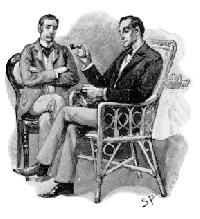Private investigator
From The Art and Popular Culture Encyclopedia
|
"THE DETECTIVE story is a kind of intellectual game. It is more — it is a sporting event. And for the writing of detective stories there are very definite laws — unwritten, perhaps, but none the less binding; and every respectable and self-respecting concocter of literary mysteries lives up to them."--"Twenty Rules for Writing Detective Stories" (1928) by S. S. Van Dine Who's the black private dick that's a sex machine to all the chicks? --"Theme from Shaft" (1971) |
|
Related e |
|
Featured: |
A private investigator, private detective, PI, or private eye, is a person who can be hired by individuals or groups to undertake investigations. Private investigators often work for attorneys in civil cases or on behalf of a defense attorney. Many work for insurance companies to investigate suspicious claims. Before the advent of no-fault divorce, many private investigators were hired to search out evidence of adultery or other illegal conduct within marriage to establish grounds for a divorce. Despite the lack of legal necessity for such evidence in many jurisdictions, according to press reports collecting evidence of adultery or other "bad behavior" by spouses and partners is still one of the most profitable activities investigators undertake, as the stakes being fought over now are child custody, alimony, or marital property disputes.
History
In 1833 Eugène François Vidocq, a French soldier, criminal and privateer, founded the first known private detective agency, "Le Bureau des Renseignements Universels pour le commerce et l'Industrie" ("The Office of Universal Information For Commerce and Industry") and hired ex-convicts. Official law enforcement tried many times to shut it down. In 1842 police arrested him in suspicion of unlawful imprisonment and taking money on false pretences after he had solved an embezzlement case. Vidocq later suspected that it had been a set-up. He was sentenced for five years with a 3,000-franc fine but the Court of Appeals released him. Vidocq is credited with having introduced record-keeping, criminology and ballistics to criminal investigation. He made the first plaster casts of shoe impressions. He created indelible ink and unalterable bond paper with his printing company. His form of anthropometrics is still partially used by French police. He is also credited for philanthropic pursuits – he claimed he never informed on anyone who had stolen for real need.
After Vidocq, the industry was born. Much of what private investigators did in the early days was to act as the police in matters that their clients felt the police were not equipped for or willing to do. A larger role for this new private investigative industry was to assist companies in labor disputes. Some early private investigators provided armed guards to act as a private militia.
In the United Kingdom, Charles Frederick Field set up an enquiry office upon his retirement from the Metropolitan Police in 1852. Field became a friend of Charles Dickens and the latter wrote articles about him. In 1862 one of his employees, the Hungarian Ignatius Paul Pollaky, left him and set up a rival agency. Although little remembered today, Pollaky's fame at the time was such that he was mentioned in various books of the 1870s and immortalized as "Paddington" Pollaky for his "keen penetration" in the 1881 comic opera, Patience.
In the United States, the Pinkerton National Detective Agency was a private detective agency established in 1850 by Allan Pinkerton. Pinkerton had become famous when he foiled a plot to assassinate then President-Elect Abraham Lincoln. Pinkerton's agents performed services which ranged from undercover investigations and detection of crimes, to plant protection and armed security. It is sometimes claimed, probably with exaggeration, that at the height of its existence the Pinkerton National Detective Agency employed more agents than the United States Army. Allan Pinkerton hired Kate Warne in 1856 as a private detective, making her the first female private detective in America.
During the union unrest in the US in the late 19th century, companies sometimes hired operatives and armed guards from the Pinkertons. In the aftermath of the Homestead Riot, several states passed so-called "anti-Pinkerton" laws restricting the importation of private security guards during union strikes. The federal Anti-Pinkerton Act of 1893 continues to prohibit an "individual employed by the Pinkerton Detective Agency, or similar organization" from being employed by "the Government of the United States or the government of the District of Columbia." Pinkerton agents were also hired to track western outlaws Jesse James, the Reno brothers, and the Wild Bunch, including Butch Cassidy and the Sundance Kid. The Pinkerton agency's logo, an eye embellished with the words "We Never Sleep," inspired the term "private eye."
It was not until the prosperity of the 1920s that the private investigator became a person accessible to the average American. With the wealth of the 1920s and the expanding of the middle class came the need of middle America for private investigators.
Since then, the private detective industry has grown with the changing needs of the public. Social issues like infidelity and unionization have impacted the industry and created new types of work, as has the need for insurance and, with it, insurance fraud, criminal defence investigations and the invention of low-cost listening devices.
Increasingly, modern PIs prefer to be known as "professional investigators" or Licensed Private Investigators (LPI's) rather than "private investigators" or "private detectives". This is a response to the image that is sometimes attributed to the profession and an effort to establish and demonstrate the industry to be a proper and respectable profession. However, in 2009 a Toronto Star journalist obtained a private investigator's license in Ontario with no training, and reported that other Ontarians had done the same.
See also


